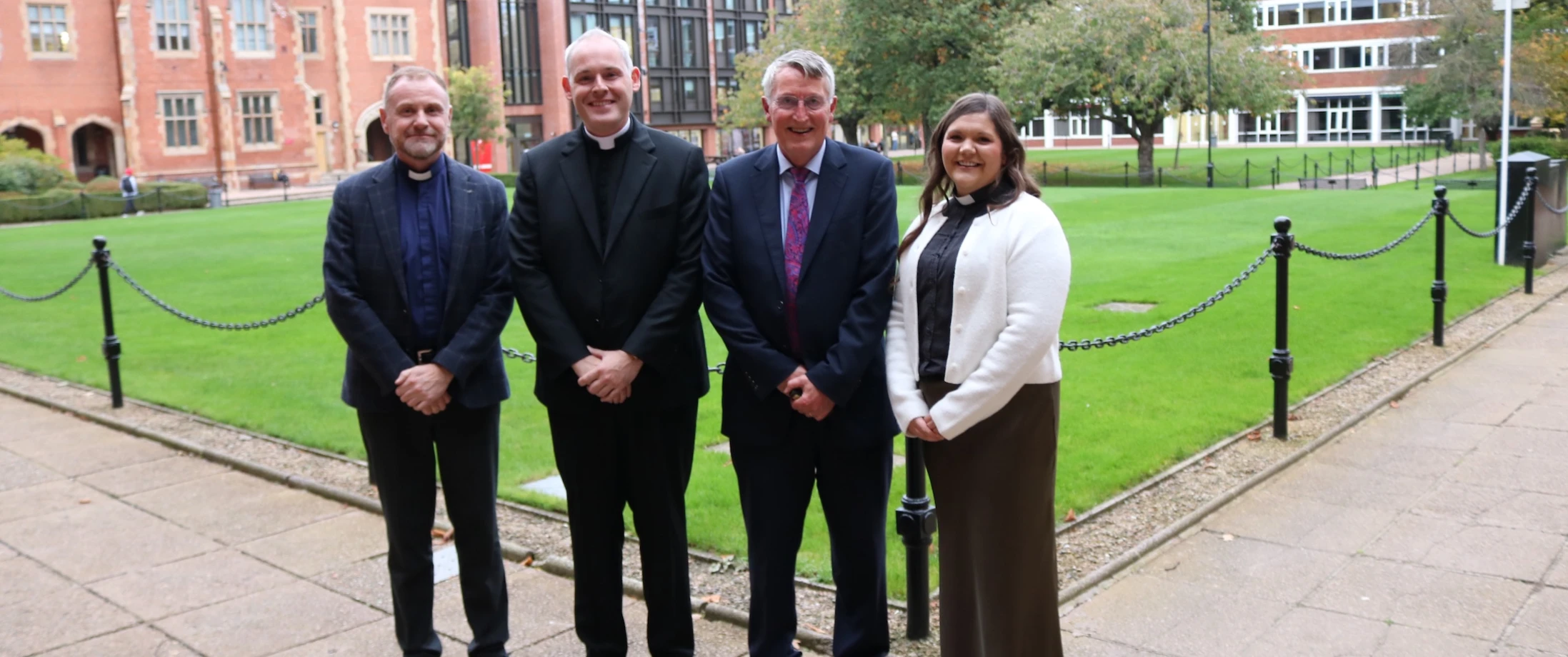Lecture at Queen’s considers care at the end of life
A clear and sensitive approach to the value of human life and care in situations of suffering was shared by Professor John Wyatt as he delivered the 67th Annual Church of Ireland Theological Lecture at Queen’s University Belfast.
Professor Wyatt worked as a paediatrician specialising in the care of newborn children in neonatal intensive care for more than 25 years, and as an academic researcher. He is Emeritus Professor of Neonatal Paediatrics, Ethics and Perinatology at University College London, and a senior researcher at the Faraday Institute for Science and Religion, Cambridge.
The annual lecture is sponsored by the Church of Ireland Board of Education (Northern Ireland) and organised by The Hub – the Church of Ireland and Methodist chaplaincy serving Belfast’s universities and colleges. The lecture on Monday 13 October was introduced by the Bishop of Connor, Bishop George Davison, and the Provost and Deputy Vice-Chancellor at Queen’s, Professor Richard Miles.
Professor Wyatt noted that the proposed legislation for assisted suicide in England and Wales would – if enacted – result in the lives of a large and increasing number of people being intentionally ended within the law. In Canada, for example, the number of people receiving medical assistance in dying increased year-on-year from 1,018 in 2016, when it was legalised, to 15,343 in 2023.
While advocacy for a change in the law has mentioned cases of extreme pain, there is a “very large mismatch” between this assertion and how people whose lives have been ended in Canada describe their suffering – most frequently as a loss of ability to engage in meaningful activities, or to perform the activities of daily living, or a loss of dignity. The experience of depending on the care of others is, though, “part of the narrative of human life” and especially at the beginning or the end of our lives.
He continued by exploring two interpretations of dignity.
Intrinsic dignity is a value that every human life carries and can never be taken away. This is “radically egalitarian” as everyone has the same dignity, from a pre-term infant to an elderly person living with dementia. In this understanding, there are no differing degrees of dignity as “every human being is a full member of the human community.”
Attributed dignity is “a value that we confer on others or on our own lives” which can vary, and therefore rise or fall, depending on how others treat us or how we view ourselves. The Christian ethical tradition holds that we cannot alter or diminish our intrinsic dignity; this leads to an attitude of compassion, gentleness and respect and seeks to enhance the attributed dignity of people who are dying.
Professor Wyatt addressed several grounds on which advocacy for assisted suicide is often based.
In terms of autonomy, patient choice is “at the heart of modern medicine” but patients do not have “unfettered” autonomy about medical treatment. Medical professionals need to discern whether the treatment is in the best interests of the patient, including whether it is evidence-based and approved for use.
Assisted suicide legislation sets out rational grounds – in the view of its advocates – to describe circumstances in which a life may be ended e.g. a terminal illness, a diagnosis that a person has six months to live, intact mental or legal capacity, and a well-founded and settled will to make that decision. Each of these criteria, Professor Wyatt suggested, was “contestable” – why should a limit be set at six months, for example? – and there was always the potential for coercion or manipulation.
Compassion is also cited in favour of assisted suicide, as a ‘moral duty’ to respond to a cry for help to end a life. However, if this interpretation of compassion were to be applied in relation to terminal illness, it could be applied in situations where dementia or a similar condition was present. A false understanding of compassion could lead to professionals deciding that some lives are “not worth living.”
Professor Wyatt quoted the Elizabethan poet and clergyman John Donne, writing that “any man’s death diminishes me, because I am involved in mankind”, and highlighted how Dame Cicely Saunders founded the hospice movement on the principle of helping people to live before they died. The Catholic philosopher Joseph Pieper wrote that love is a way of saying to another person: “It’s good that you exist. It’s good that you are in the world.”
Concluding the question and response time which followed the lecture, he described modelling dignity as being on the same level as a person in need, sitting in silence with them, listening, and showing them that they are as important as the person giving that care. “There’s always more to learn,” he remarked, “but it’s the greatest gift you can give anyone.”
Pictured above: The chaplains at Queen’s with Professor Wyatt – the Revd Nigel Craig (Presbyterian, at left), Fr Dominic McGrattan (Catholic), and the Revd Danielle McCullagh (Church of Ireland and Methodist).
Note
Statistics in relation to Canada are provided in the Fifth Annual Report on Medical Assistance in Dying in Canada, 2023, published by the Government of Canada at the following link: https://tinyurl.com/2s7fsjbf
